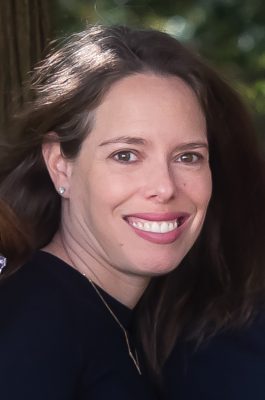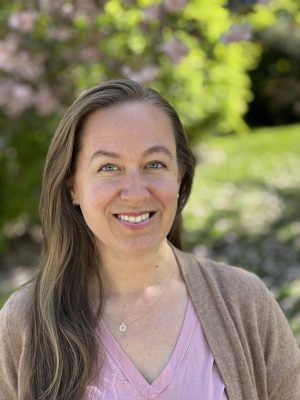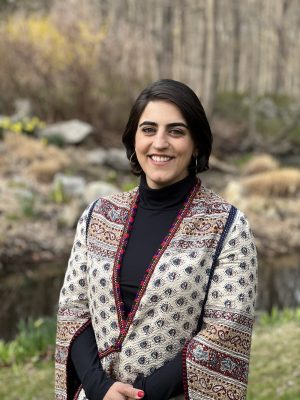First-Time Candidates on Ballot in Chappaqua Board of Ed Race
The decision by the two senior members of the Chappaqua Board of Education, President Jane Shepardson and Vice President Warren Messner, to leave the board at the end of their terms next month, has created an opportunity for new two faces to emerge from the community to serve.
Four first-time candidates are on the ballot for the two open seats in Tuesday’s school board election – Matthew Auerbach, Alissa Dorfman, Beret Flom and Shokoofeh Rajabzadeh.
Voting for the election and on the Chappaqua School District’s $138.3 million 2023-24 budget will be at the Horace Greeley High School gymnasium from 7 a.m. to 9 p.m. on Tuesday, May 16.
Matthew Auerbach

Until a few weeks before the deadline to return petitions to the district clerk’s office to get on the ballot, Auerbach hadn’t thought about running for the board. But at a school safety and security meeting at Westorchard Elementary School, where his daughter goes to school, he was approached by several other parents.
Auerbach, an equities and derivatives trader, was intrigued by the possibility while realizing that most recent board members have had older children who are in the high school or middle school or who have already graduated from the district.
“I was interested in the fact that my demographic, people who have children who are just ready to go through the system, are very under-represented,” Auerbach said. “Our opinion on school safety, being the hot-button issue of the moment, or teacher retention or curriculum or any one of the issues that we’re facing in the schools are not suppressed but are not addressed because we’re starting out.”
Regarding safety, Auerbach supports the district finding a way to have an officer in as many schools as possible, which could serve not only as a line of defense or a deterrent, but someone who becomes part of the school’s culture and forms relationships with the students.
“If our kids are not safe at school, then all the rest of the issues that we can discuss and talk through really don’t matter,” Auerbach said.
With a growing concern in the community over the rate of high teacher turnover in the district, Auerbach said Chappaqua should never have a problem retaining faculty. He questioned whether there is sufficient teacher input regarding curriculum or school safety.
“It seems, at least from some of the conversations that I’ve had, that they’re not,” Auerbach said.
He added that while the district is justifiably proud of the stature of Horace Greeley High School, there should also be emphasis on making sure the faculty at the elementary and middle schools, which help prepare the students for when they get older, are listened to. They should be equally lauded for the work that they do, Auerbach said.
As a parent, the only drawback that Auerbach has seen in the district is its lack of diversity. A graduate of a large New York City high school, Auerbach said district officials need to work hard to ensure that students who belong to different groups feel as appreciated as everyone else.
He said the district needs to figure out how it’s going to replace Phillip Marcus, hired in the fall of 2020 as the director of equity, inclusion & wellness, but left in November. His departure spurred high school students and community members to confront the board and administration about their plans to fill the role and address the issue.
“I think it’s important to fill that role from my perspective,” Auerbach said. “I feel like it’s an important job, and it’s a serious job in a district like this. I can’t speak for (district officials) but I would hope that replacing him would be a priority.”
Although Auerbach has lived in town for only three years, his candidacy has brought him into contact with community members beyond those who go to his daughter’s school.
“I want to make sure that what’s happening to my kids and my friends’ kids and all the kids that I’ve met and grown to love since I’ve been here are taken care of as opposed to waiting until they’re at the tail end of their education here,” Auerbach said.
Alissa Dorfman

Since moving to town in 2007, Dorfman has experienced the Chappaqua School District from multiple perspectives. She was involved with the Roaring Brook Elementary School PTA, chaired the PTA at Bell Middle School, has served on an assortment of committees. This year, Dorfman served as co-chair of the Bell Theater.
The ages of her three daughters are spaced so that for each one of her 16 years in the community, Dorfman has had a child in a district school – and has several more years to go, with her two youngest in sixth and 11th grades.
“So I just think in these 16 years I have basically had every PTA job that exists and really enjoy giving back to the community and it really felt natural for me that the board is the next level of service for me,” said Dorfman, who was a financial planner for Saks Fifth Avenue in its buying department before choosing to stay home to raise her children. Since 2015, Dorfman has been a professional organizer.
Dorfman applauded Chappaqua schools for being forward-thinking in its curriculum approach to continually challenge students, which helps make it a top-notch district. In the last few years, it has moved the biology Regents program and algebra from ninth to eighth grades, although there were concerns about the latter from many parents who were worried either that it might be too advanced for their child or there wouldn’t be another chance to get on the advanced track.
With an unusually larger group of teachers leaving the district triggering questions in the community, Dorfman said it’s essential the district learns what factors may be causing faculty turnover. Some were tenure denials, she said, and there were more determinations to be made this year after a larger number of probationary teachers had their tenure decisions delayed because of COVID. The public may also never learn the cause because of the confidentiality of personnel decisions, she said.
But Dorfman doesn’t believe that there is anything inherently wrong in the district that’s forcing teachers to leave.
“The district needs to do a better job when it’s not going well for a teacher, and they might have an inkling that it’s not going to end with tenure, just to give them a better sense of where they’re really standing earlier in the process,” Dorfman said.
The sentiment of not being welcomed and feeling out of place, particularly from students of color, is a challenge for the district, she said. Several troubling incidents at the middle school have also been deeply concerning, Dorfman said.
District officials need to find a way to better diversify the staff, which has been the goal, but also consider revising the Diversity, Inclusion and Equity (DEI) curriculum and programs, including in the lower grades, she said.
“Everyone’s intention around this issue is really good and I think that we just need to keep educating our children through various programs,” Dorfman said.
Professional development efforts to help teachers create a more supportive classroom for all students is also a tool that needs to continue, she said.
Dorfman acknowledged that there has been learning loss and gaps stemming from the pandemic shutdown. However, the emotional development that children lost out on, particularly middle school students and older elementary school students, should be addressed. Although the district appears to have the correct number of counselors and social workers, Dorfman would like to school officials be more proactive in identifying students who need help.
“I think identifying these kids who are really suffering early on can stop a myriad of problems later on, which blends into the school safety issue,” Dorfman said.
Recent discussions about whether there should be school resource officers at all schools has spotlighted the safety of the buildings for parents. Dorfman said she is open to that possibility, especially since having an SRO at the high school has proven successful. It’s also reasonable for the parents of younger children to feel uneasy, particularly Westorchard and Seven Bridges families, since they are the furthest from downtown, she said.
“If there’s something we can do to help people sleep a little better at night, then we should do it,” Dorfman said. “In the end, it’s an emotional issue on all sides, but I just feel like everyone would feel we are doing the most we can if we implement this next step, and I feel like it’s probably going to happen and it should happen.”
Beret Flom

Flom’s introduction to the Chappaqua School District came when she began advocating with other community members to expand before and afterschool child care programs. The efforts proved successful as the program will be expanding from 10 slots for each elementary school to likely being able to meet the demand for next year, she said.
“When I was doing that, I thought my skills and experience could be an asset to the district, so I thought I would run and try to do my civic duty,” said Flom, an attorney specializing in Social Security and disability work.
While Chappaqua has a stellar academic reputation, there are always areas that can be improved. Flom said the five-year strategic plan currently being developed could identify potential enhancements. Flom would like to see is foreign language offered in the elementary schools.
Flom said the teacher retention issue, which she characterized as teacher turnover, has come to light this year, a matter the district must take seriously. She mentioned that there may be issues surrounding the observations and evaluations of probationary teachers that lead to a decision on tenure.
While there are many people involved in the process, consistency from the evaluators at the building level and central administration is needed, Flom said, so the teacher understands what is expected of them. The district could also make improvements in explaining the tenure process more clearly to the public.
“I’ve seen people concerned about transparency, but I don’t think the district has a transparency issue, I think it’s a communication issue, and my experience with the district has always been amazing with both the board and the district,” Flom said.
She would also like to see the district encourage parents to provide positive feedback about their child’s teacher when possible.
Flom said the district did well a few years ago responding to diversity, equity and inclusion issues while working with the CARES Committee. The district must also pay attention to the students’ experiences. She said it’s important to have the director of diversity, inclusion & wellness filled, whether it’s one person or multiple people spread throughout the district, she said.
“I would certainly push for that, but even as a parent I still see it,” Flom said.
Efforts must also continue to diversify the teaching staff, although Flom acknowledges that it’s not something that can change quickly, but must be part of a sustained effort.
To help recover from leaning loss from the pandemic, Flom would want to make sure the district is evaluating its reading program, keeping a close eye on test scores to determine if there has been regression and to make sure the curriculum is responding to the issues.
Flom said the district has done a good job in addressing students’ social-emotional issues by supporting and training teachers.
Along with teacher turnover, school safety has been front and center on many parents’ minds. Flom said there is no single correct answer as some community members clamor for more school resource officers.
“I see SROs as one piece of the puzzle,” Flom said. “There’s training staff and partnering with law enforcement agencies, to a focus on training and responding, and also there are options of addressing certain physical vulnerabilities in the district as well as reviewing the safety protocols and the lock-in and lock-out procedures and making sure that they are the best practices.”
Another safety measure is to focus on the results of the recent Belonging Survey, and district officials must understand what the community is conveying, she said.
“We can make sure that all students are connected to an adult in the district and a student in the district and doing everything in our power to ensure our resources are being used responsibly,” Flom said.
Shokoofeh Rajabzadeh

Education has been at the center of Rajabzadeh’s career. Currently a program manager for an educational nonprofit organization, she has run initiatives in inclusivity, the teaching of history and access to the arts. Currently, Rajabzadeh is overseeing arts academies for K-12 students in New York City, but has worked in classrooms with pre-school-age children to college students.
Issues surrounding youngsters’ mental health was a key motivator for her to enter the race for school board this year.
“There’s a huge mental health crisis affecting our kids, the feeling of belonging has just decreased more and more despite how much more hyperconnected our world has become, the feeling of belonging in our children and in our youth has just continued to decrease,” Rajabzadeh said.
“I want to be able to use the expertise I have to serve the students that are around me and serve the community that I am part of,” she added.
Rajabzadeh said she would push for greater services for students, including determining whether there are enough psychologists and mental health professionals. The district has accomplished some of that where students have access to a trusted adult, Rajabzadeh said.
The mental health piece should also be integrated into the full school experience, including curriculum and after-school services.
“So I think having someone on the board to keep on returning us to that question I think will help us find newer ways to really center that and to make that a central part of the conversation,” Rajabzadeh said.
Even though Chappaqua did an excellent job at getting schools open sooner than many districts, some students are still struggling with the expectations of returning to normalcy, she said. Extra attention must be given to the current seventh- to ninth-graders, who appear to be struggling as a group more than some other age brackets, Rajabzadeh added.
For some students, seeing a trusted teacher leave the district can also be difficult, particularly with the upheaval caused by the pandemic, she said. That’s where greater transparency regarding teacher retention and the decisions that go into tenure is needed. Otherwise, feelings of distrust and anxiety in the community can fester.
Sharing details of the rubric that’s used toward determining tenure is something that should also be considered.
“What I want to do when I get on the board is just to focus on ways where we can increase transparency around teacher retention to the extent that it’s possible while respecting privacy,” Rajabzadeh said.
Issues surrounding inclusivity and making marginalized groups feel welcome has been a problem for the district, according to students who spoke at board meetings earlier this school year. Rajabzadeh said while the district and the town have worked hard to achieve a more inclusive community, officials have to communicate what the restructuring of the director of diversity, inclusion & wellness will resemble.
An inclusive environment not only helps students in the minority groups, but all students in a diverse nation, she said.
“It sets them up to be better citizens of the world when they move beyond this town, which is very homogenous,” Rajabzadeh said. “We can’t just have them be successful here. We want to help our children to set them up for success beyond.”
Rajabzadeh is encouraged that in recent weeks the community has had a conversation about the safety and security of its school buildings. It’s a vitally important discussion, including whether to add school resource officers.
She said her background will allow her to help improve communication in the district and she will bring life experiences to the board that might not be represented.
“I think it really helps to have a diverse body as a Board of Education, it helps to have different professions on there, it helps to have people with different age kids,” Rajabzadeh said. “It helps them to have different perspectives.”

Martin has more than 30 years experience covering local news in Westchester and Putnam counties, including a frequent focus on zoning and planning issues. He has been editor-in-chief of The Examiner since its inception in 2007. Read more from Martin’s editor-author bio here. Read Martin’s archived work here: https://www.theexaminernews.com/author/martin-wilbur2007/
